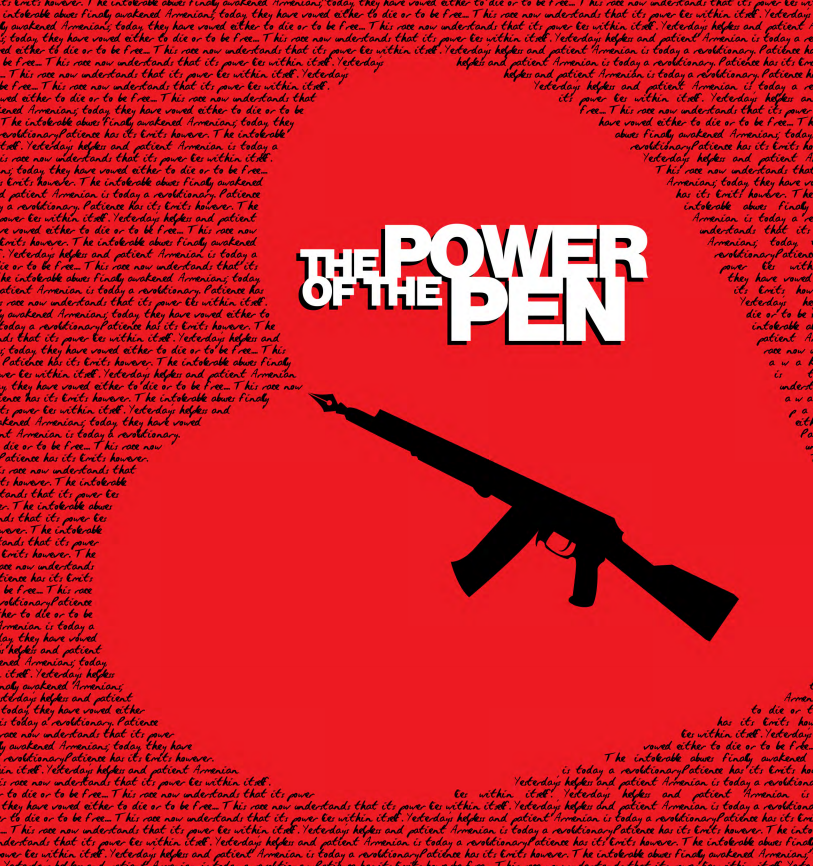The Pen and the Sword: Teacher Reflects on Armenian Legacy of Survival and Hope
June 27, 2016Special for the Armenian Weekly
The ink is often found on my third finger as a testament to my deep affinity for pens. Maybe it’s because of my father’s fascination with old pens—Parkers, Waterman, Conklin, or even push-button Bics—or it could stem from the fact that his parents did not have pens in the sands of far away lands during the genocide; rather than using pens, they used their fingers in the sand, teaching their children to read by gracefully tracing letters of one of the oldest known alphabets in the world: the Armenian alphabet.
First came the word, and maybe, just maybe, the word came with a pen. So, that said, I began collecting pens. It began with ballpoints and morphed into a deep obsession with Parker Sonnet fountain pens. The advertisement for Parker Sonnets read, “Choose your life—will it be poetry or prose?” I would like to say that this essay is about pens, but this is about something bigger than that, and much bigger than me.
If the pen is indeed mightier than the sword, and if words are stronger than knives, then I am perplexed as to how a sword is my most beloved and symbolic object. Silver and etched with the markings of the military, encased in a mahogany box, it lies above my piano stating, “Thank you for your undying support, I would not be here without your support and love.” –Second Lieutenant Rey Toledo.
How ironic that this is a reminder and form of support for me as I walk through the labyrinth of what may very well be the most under-appreciated profession on the face of the earth, and what may very well be the most important job in the universe. I often come home, exhausted, aching, questioning why I entered this field. I could have been a lawyer, a techie, a sales rep for a downtown firm that gives you free Odwalla and doesn’t have rotten bologna sandwiches on the floor. I repeat the motto of the Air Force—“Integrity first. Service before self. Excellence in all we do”—and attempt to earn the right, every day, to have the honor of owning an Air Force Saber.
I am sitting in seat 2, row Q, section L-7 at Falcon Stadium in Colorado Springs at the USAFA 2014 graduation. The ticket for the graduation ceremony has a picture of the USAFA class ring, which is inscribed with “Aeque ac Machina”; translated from Latin, it reads “Just as a Machine,” emphasizing the cohesion of a group towards a common goal. There is a picture of an eagle looking towards the right, towards peace, because I now know that the ultimate goal of the military is to end conflict.
What at first I think are photographers and then find are snipers are sitting behind us as Vice President Biden walks on stage to present my student with his diploma. I am about to observe the miracle of what comes out of my classroom. This child, a hip hop-listening, hoodie-wearing athlete from Daly City, Calif., who would often stress out about essays, is now not only receiving his diploma from the vice president of the United States, but is remembering a promise I made to him: “I will write your recommendation only if you promise to graduate with military honors, and if that happens, I promise to bring my whole family to your graduation.”
As I told him this, I thought of the quote by the Armenian novelist Raffi Melik Hagopian, my father’s favorite writer: “While the prudent stand and ponder, the fool has already crossed the river.” For me, supporting these students is sometimes the revolutionary act of “crossing the river.”
After graduation, after the hugs, the accolades, the thundering sound of F22s in a flyover, and the tears of joy and trepidation as we parents watched our children choose a noble life of service, we were invited to a dinner at a steakhouse. Rey walked in with a case, and I walk in with mine. After all, what do you give a kid as a graduation gift—a great pen, a Conklin, in camouflage colors with a fine-point gold tip printed in Toledo, Ohio. It’s what you do. It’s appropriate. It’s intellectually symbolic. But, what does a student give as a token of his appreciation? A sword. Because, if the pen is indeed mightier than the sword, it is the pen that led to it, and it is the sword which symbolizes my dedication to making sure that each and every student in my classroom fights through the labyrinth to face the shining light of success. Every student is a symbol to me of Armenian perseverance, “hayabahbanum,” and the legacy of survival and hope that I inherited as a descendant of the Armenian Genocide.
Source: Armenian Weekly
Link: The Pen and the Sword: Teacher Reflects on Armenian Legacy of Survival and Hope
